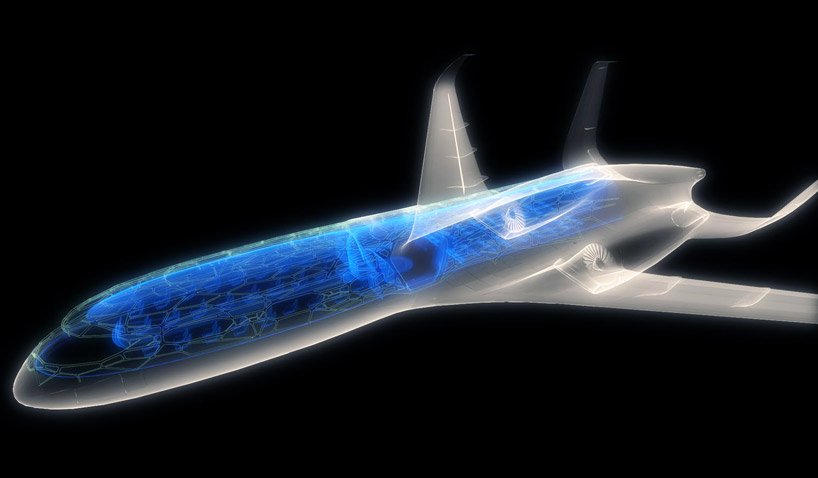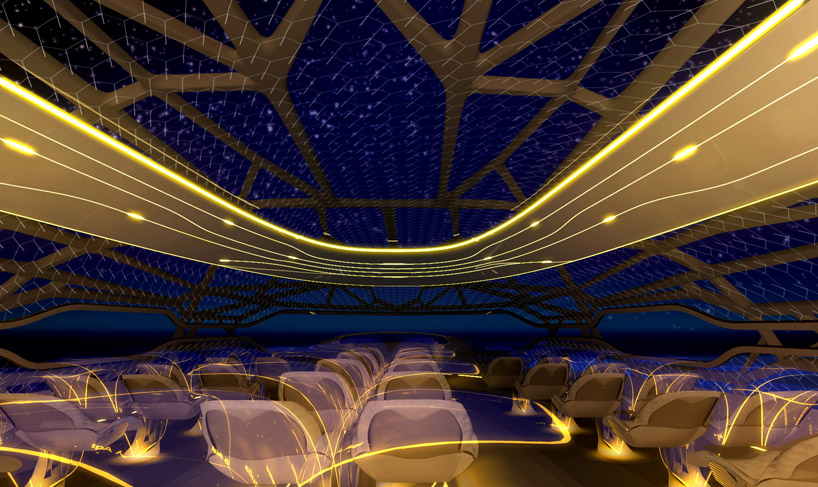
the 'airbus 2050' concept
all images © airbus S.A.S (2011)
designed in response to user surveys about the future of air travel, the 'airbus 2050' concept craft houses replaces
first, business, and economy classes with lifestyle 'zones', all housed in a panoramic transparent body designed
for both more comfortable travel and improved environmental efficiency.
in the concept cabin, hand luggage is taken at the entrance to the craft as passengers scan in via a biometric hand sensor,
and is moved automatically to one's seat. the chairs themselves morph to comfortably fit passengers' bodies, and collect
body heat for use in powering the cabin facilities.
video overview of the concept aircraft
airbus predicts the increased presence of bars and other social spaces on airplanes, providing a space for passengers
who wish to socialize with others. in the 'airbus 2050', personalized 'zones' replace the traditional cabin classes.
the 'smart tech' zone offers integrated technology and private 'pop-up pods' with immersive screens
that permit virtual meetings and lectures, or can connect travelers to friends and family.
foreseeing a growing demand for health and relaxation services, owing to the growth in the female and elderly populations,
the seats in the 'vitalizing zone' adapt to the passenger's body shape, as well as provide massages and relaxing 'sound showers'
and aromatherapy as desired.
the 'interaction zone' provides a place for passengers to engage in virtual activities. a virtual shopping wall,
perhaps used in conjunction with a sky mall -like service, projects clothing directly onto shoppers,
while a virtual gaming wall integrates gestural sports gaming. 'airbus fusion ball' lets passengers play catch
across travel destinations like new york skyscrapers and the himalayas.

seating in the 'smart tech' zone seamlessly integrates technology into the flight experience

the 'interaction zone' features private pods for virtual shopping and gaming, as in this golf game

full exterior view
the airplane itself benefits from the use of lightweight 'smart' materials and composites, as well as longer and slimmer wings
that improve air flow and fuel efficiency. engines will be embedded into the rear of the craft, optimizing fuel use
and reducing noise levels within. the electrical system is self-monitoring, capable of scheduling any required maintenance.
regarding the transparent body, airbus head of engineering charles champion states:
'the idea is to have a technology for the fuselage that's a bit like bones of birds that allows to have large spaces
that can turn transparent, in order to look outside and 'live' the panorama in which you are flying.'
the plane's empennage (tail section) is U-shaped to reduce external noise pollution, since the more reliable engines
prevent the need to have a vertical tail for directional stability.

the body's transparency can be turned on and off

rendering of interior night view
the cost of the innovative cabin designs would be defrayed by reducing maintenance costs in other areas,
relying on developments in self-monitoring, 'intelligent' technology and advances in innovative materials
such as dirt repellent coatings and self-healing covers.
via pcmag
Nincsenek megjegyzések:
Megjegyzés küldése